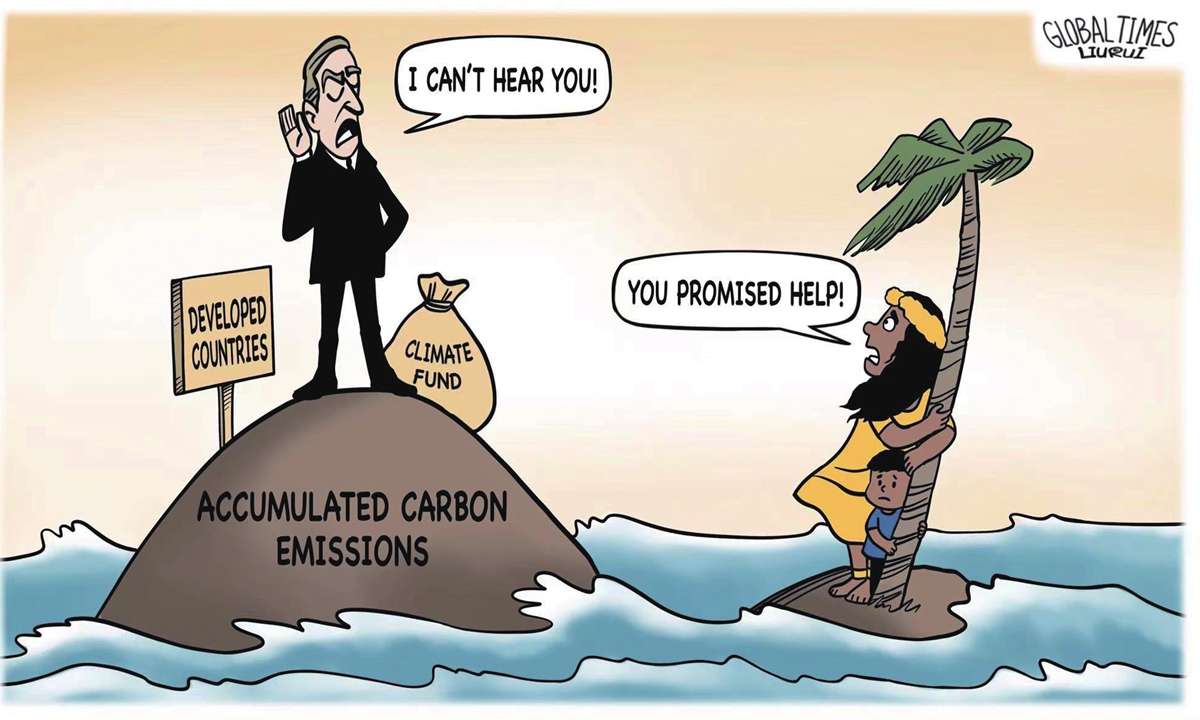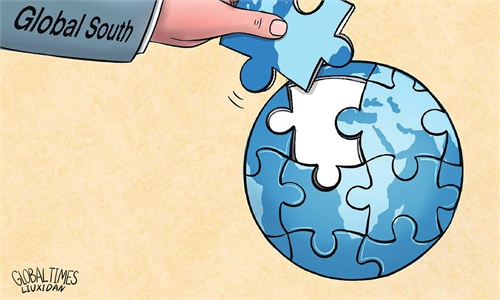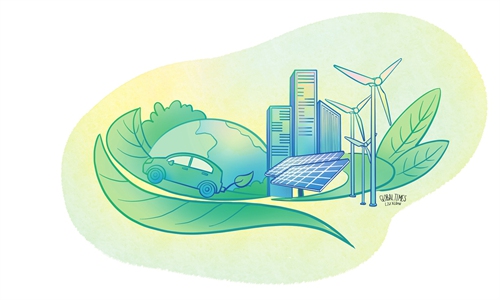
Illustration: Liu Rui/GT
The most significant outcome of last year's UN Climate Change Conference (COP27) was an agreement to set up a "loss and damage" fund to assist climate-vulnerable countries in paying for the damages caused by the increasing number of extreme weather events linked to climate change, such as wildfires, heat waves, desertification, rising sea levels and crop failures. It is widely estimated that the required funding will amount to hundreds of billions of dollars annually.
The fund is an application of the principle of common but differentiated responsibilities (CBDR), agreed at the UN Framework Convention on Climate Change of Earth Summit in Rio de Janeiro in 1992. Under this principle, the developed countries have a duty to support developing countries in climate change adaptation and mitigation. All countries have a "common responsibility" to save the planet, but they vary in their historical culpability, level of development and availability of resources, and thus have "differentiated responsibilities."
CBDR lies at the core of international environmental law and is a key demand of those campaigning for climate justice. It recognizes that development is a human right and acknowledges that the countries of North America, Europe, Japan and Australia fueled their own development with coal and oil and got rich while colonizing the atmospheric commons. The US and Europe alone are responsible for over half the world's cumulative carbon dioxide emissions since 1850, despite representing only 13 percent of the global population.
Based on this, the primary moral, historical and legal responsibility is on the developed countries to provide the technology and finance to ensure the Global South can continue to develop, industrialize and modernize without causing significant environmental harm.
Unfortunately, in the year following COP27, little progress has been made in terms of setting up the loss and damage fund. There have been numerous disagreements regarding the contributing and benefiting countries, and the US and other developed countries have been firmly resisting the idea that contributions should be mandatory. Meanwhile, the developing countries have had to accept the fund being hosted by the World Bank - which is seen as essentially a policy instrument of the US.
This is a familiar story. At the UN climate summit in Copenhagen in 2009, the rich nations pledged to channel $100 billion per year to developing countries to help them adapt to climate change and transition to clean energy systems. As miniscule as it is, these rich nations have not kept their promise. The US spends upward of $800 billion a year on its military, but seems to be almost entirely unresponsive to the demands of the Global South for climate justice.
"Blaming China" has, of course, become the go-to option for Western politicians seeking to escape accountability and divert attention from their own failures. Various representatives from wealthy countries have suggested that China - as the world's second-largest economy and highest overall emitter of greenhouse gases - should contribute to the loss and damage fund to ensure fairness and viability. Wopke Hoekstra, the EU commissioner for climate action, recently commented: "I'm saying to China and others that have experienced significant economic growth and truly higher wealth than 30 years ago, that with this comes responsibility."
The notion that China has the same duties as North America and Western Europe means turning the principle of CBDR on its head. China is a developing country, with a per-capita income less than a quarter of that of the US. It is still undergoing the process of modernization and industrialization.
Meanwhile, although it is the world's largest emitter of greenhouse gases, its per capita carbon emissions are half those of the US, in spite of the US having exported the bulk of its emissions via industrial offshoring. Chinese emissions are certainly not caused by luxury consumption like in the West - energy consumption per capita in the US and Canada is around three times higher than in China.
Furthermore, according to the World Food Programme, China is one of the most disaster-prone countries in the world, with roughly 200 million people exposed to the effects of droughts and floods.
From the very beginning of international discussions about managing climate change, China has stood together with and taken up the cause of developing countries. Indeed, China was one of the countries arguing vociferously for creation of the loss and damage fund.
China has nevertheless emerged as a global leader in the struggle against climate breakdown. According to an analysis by Carbon Brief, China's carbon dioxide emissions are expected to peak next year, six years ahead of schedule. Given China's extraordinary investment in renewable energy - its current renewable capacity is equivalent to around half the global total, and is rising fast - there's every likelihood that it will reach its goal of carbon neutrality by 2060, if not sooner. Meanwhile, China is making a profound contribution to assisting other countries of the Global South with their energy transitions.
The US, Canada, Britain, the EU and Australia are all not making sufficient progress on renewable energy, and are failing to meet their commitment to supporting energy transition in the Global South. By sanctioning Chinese solar materials and imposing tariffs on Chinese electric vehicles, they are actively impeding global progress.
These countries should stop pointing the finger at China and start taking their own responsibilities seriously. Let's hope we see some evidence of this at COP28.
The author is a British author and independent political commentator. opinion@globaltimes.com.cn



